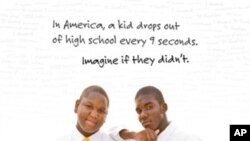Mary Mazzio's documentary, "Ten9Eight Shoot for the Moon" opens with this idea: "Every nine seconds a teenager in the U.S. drops out of high school. Imagine if they didn't." It's the inspiring story of underprivileged high school students who turn their lives around by learning business skills and competing for a $10,000 prize.
The competition is fierce. Out of 24,000 contestants in the United States that enter, only 34 advance to the finals in New York City.
The test monitor is serious and to the point: "You have 8.5 minutes to present and judges will have three minutes for questions."
The young people participate in what's called The National Business Plan Competition Of The Network For Teaching Entrepreneurship. NFTE, for short. Is a non-profit organization that helps thousands of young men and women from low-income communities across the U.S. develop business skills. The students present a viable business plan to a panel of educators, community leaders and entrepreneurs. The winner gets $10,000 and a chance to change their lives.
Filmmaker Mary Mazzio follows 12 of these kids from start to finish. The students begin by learning how to write a business plan that charts the course of their future company. The young entrepreneurs create businesses that range from making organic candles and custom guitars, to innovative eye shields for football helmets.
They have to know math, how to communicate effectively with others, and convince potential investors their plan is worthy of financing.
These teens say they had never imagined they would change so dramatically, from potential high school dropouts into confident business owners and college students.
"I never thought this could make me millions of dollars," says Jasmine Lawrence one of the contestants from a previous competition.
Rodney Walker is the founder of Forever Life Video Productions, a business of wedding videos with original music.
"I was five years old when I first came into the foster system," says Rodney.
Like most inner city kids Rodney had a tough life. He was taken away from his parents. His father, a Vietnam veteran, was a heroin addict. Rodney had to fight against all odds to stay in school. He says the business competition helped him gain the confidence and strength he needed to fulfill his dreams.
"I still had to go home to a drug infested community, to poverty, to gang violence," he says. "That was still there and that was still very real. They only thing that had changed was my aspirations and my means of finding a way out."
Amanda Loyola and Jessica Cervantes came from struggling families. Amanda's and Jessica's parents are immigrants. Amanda Loyola says her family taught her to aim high.
"I use them as an example how I live my life. They came here with nothing. They didn't speak much English in the beginning."
Mazzio's lens captures the hopes and fears but also the tenacity and drive of these young people.
"We were greeted so warmly, and with such hospitality in these neighborhoods that it really shattered my own preconceptions of what life in the inner city was like and who populated that," says the filmmaker.
Many are motivated teenagers determined to make it. When asked what does it take to make their dreams come true they said: "Believe that you'll succeed and you'll do it." "It takes common sense." "Dedication." "Initiative." "Never think negative things." "You got to be willing to take risks."
Mazzio also took a risk. On the day of the premiere she was afraid that young people would not come to watch the film. Instead, she says, the theaters were packed with inner city kids paying rapt attention to the large screen, absorbed by the dream of success.
Documentary 'Ten9Eight' Shows US Inner City Kids Dreaming Big

In Mary Mazzio's film, underprivileged high school students chart their business futures








